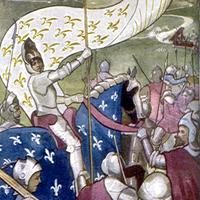34. Golden Goa
"Where the gorgeous East, with richest hand, Showers on her kings barbaric pearls and gold. " —MILTON. While Vasco da Gama was on his way back from India to Portugal, another expedition left Lisbon under a man who was destined to be one of the wisest and justest of Portuguese rulers in that far-off country. Affonso d'Albuquerque was brought up at the Court of the King of Portugal, and taught with the king's own sons. He had shown himself fearless in battle, chivalrous in action, and wise in times of peace. It was natural, therefore, that he should be selected to take charge of three ships—bound, as all ships from Portugal were bound at this time, for the coast of India.
He soon returned from a successful voyage to lay before the king his idea of closing other routes to this rich country of India, so that Portugal alone could get its treasure. Up to this time ships manned by the Moors and Arabs had taken the treasure to Ormuz, a rich city on the Persian Gulf, whence it was taken to the mouth of the Euphrates, across Asia Minor on caravans to the coast, and shipped thus to Europe. Or it was taken by ship to Suez, thence by caravan to Cairo, and down the Nile to Alexandria, whence ships from Venice distributed it to Europe.
"This must be stopped," said Albuquerque, jealous for his country's wealth. And with this object in view he again started for the East. He sailed to Ormuz, "the richest jewel set in the ring of the world," as the old writer called it, and grasped the importance of getting the town to stop the trade between India and Europe that way. Having arranged matters to his satisfaction with the King of Ormuz, and planned a Portuguese fort, he cruised about on the shores of Arabia, establishing the power of Portugal everywhere.
Then he sailed to India, where by royal orders he was made Governor.
One of his first acts was the capture of the town of Goa, to the north of Calicut, for the commercial capital of the Portuguese in India. The island of Goa was formed by the mouths of two rivers, which fitted it easily for defence. There was safe anchorage, and it had long been visited by the merchants of many nations. The capture of Goa was not easy, but Albuquerque was determined to take it, and finally did so. He then forbade the towns of Calicut and others to buy and sell, so that Goa—"Golden Goa" as she was called—became one of the most splendid and wealthy cities on the face of the earth for the next hundred years. Ships laden with the wealth of India sailed from Goa to Lisbon, and no one was allowed to trade with India except by leave of the Portuguese at this time.
On the east coast of Africa to-day we have names surviving from these times. Algoa Bay—to Goa—was a stopping-place for ships journeying to this great Indian island of Goa; while Delagoa Bay, farther north and still belonging to the Portuguese, was the other stopping-place back from Goa, as its name implies.
Early in the year 1513 Albuquerque sailed out of the harbour of Goa, bound for the Red Sea, with a fleet of twenty ships.
Now the Arabs living on the shores of the Red Sea greatly resented the Portuguese taking away their trade with India, and when they heard that the fleet was already sailing for Aden, a town at the narrow straits leading into the Red Sea, they lit fires on the hills beyond, to lure the ships to destruction. But the Portuguese steered safely into harbour, and after an unsuccessful attempt to storm the city, set fire to the ships and sailed on. Albuquerque explored the shores of the Red Sea, but did not reach Suez, the goal he had in view. It is, however, an interesting point to be noted here, that the route from Europe to India that Albuquerque tried to close is to-day the short highway for ships to the far East. For in the year 1869 the Suez canal was opened, 100 miles in length, which joined the Mediterranean Sea with the Red Sea.
Albuquerque now sailed back past Aden to the mouth of the Persian Gulf in order to reduce Ormuz. For the old king was dead, and the Portuguese fortress was not finished. The great governor of India and conqueror of Goa soon made his presence felt. Ormuz was conquered and the fortress completed. The fame of Albuquerque was now at its height, but his health was broken.
Day by day he grew worse. Such was his fame that people from all over the country came to the fortress at Ormuz to try and get a sight of him. If perchance he rode out on horseback, so great was the crowd that he could hardly go forward. At last he felt sure the end was nearing. He wished to reach Goa, the city he had conquered, the city he loved.
So one day, early in November 1515, a ship sailed away from Ormuz bearing the dying man back to India. A deep sorrow awaited him. He lived to learn that the king had appointed another governor to succeed him.
"In bad repute with men because of the king, and in bad repute with the king because of men," cried the dying man, holding up his hands. "It were well that I were gone. " Outside Goa, the great capital of Indian commerce, he died; and so great was the crying and weeping on all sides, that it seemed as if "the very river of God was being poured out," cried the old chronicler.

